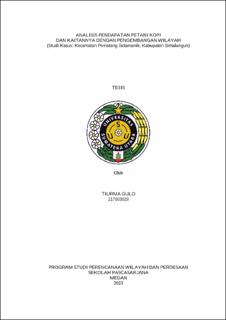| dc.description.abstract | The plantation sector, particularly coffee cultivation, plays a central role in Indonesia's economy, contributing significantly to the agricultural sector. Pematang Sidamanik Subdistrict in Simalungun Regency is the focal point of this study as the largest coffee producer in the region. Employing a case study approach, the research focuses on Pematang Sidamanik Subdistrict to analyze the interrelation between coffee farmers' income and the potential for regional development. In this context, government policies, infrastructure availability, and the role of farmer institutions are evaluated as determining factors. Multiple linear regression analysis is employed to understand the extent to which these factors influence coffee farmers' income. The results indicate that supportive infrastructure and farmer institutions, both collectively and individually, significantly impact the income of coffee farmers in Pematang Sidamanik Subdistrict. These factors emerge as primary drivers in enhancing the economic outcomes for farmers. The increased income of coffee farmers in the subdistrict holds positive potential for regional development, contingent upon proactive government policies promoting economic and social progress. This success also generates positive impacts on community welfare through increased income, consumption, and access to health and education services. Furthermore, it contributes to regional economic growth by boosting consumption, investment, and savings among coffee farmers, potentially reinforcing the region's food security. | en_US |


